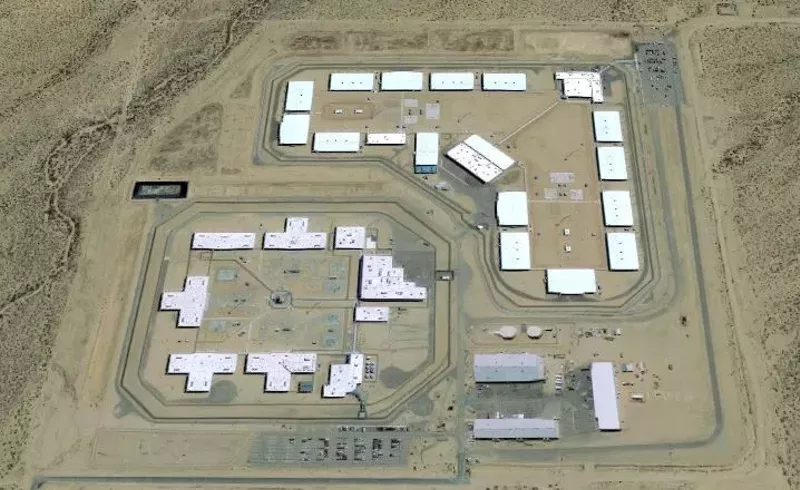Original story follows:
For the past five days, the 3,500 men incarcerated at the state prison in Kingman have had access to half the amount of water they usually do, the state Department of Corrections said on Tuesday.
Details surrounding the problem and the timeline for its resolution remain unclear, given conflicting explanations of the situation. State corrections officials, state-contracted prison operator GEO Group, and officials in Mohave County, which supplies the water to Kingman Prison, are saying different things, although they agree that the failure stems from a Mohave County well that was taken offline for repairs.
The water cuts in the Kingman complex come about five weeks after the state prison complex in Douglas lost access to running water for four days, leaving more than 2,000 people to rely on 50 portable toilets and fight over bottled water.
Water has been restricted at the Kingman Prison since July 11, when Mohave County told the prison that it had to temporarily limit the water supply. In Kingman, outside daytime temperatures are hovering near or above 100 degrees Fahrenheit.
Full service should be restored on Friday, said Andrew Wilder, a spokesperson for the Arizona Department of Corrections, although that statement contradicted a claim from Mohave County that service had already been fully restored.
Showers are on "a modified schedule," as is laundry, and the prison is keeping bottled water and portable toilets on hand — just in case, Wilder added, and "contingency plans are in place should there be any additional disruption in water levels or service." He said that access to drinking water, sinks, and toilets "has not been impacted or restricted in any way."
These latest issues at the state prison complex in Kingman add to a growing list of recent problems and mismanagement with the state prison system, including the Douglas water shortage, examples of severe medical neglect, and exposure of a long-running problem with broken locks that have led to inmate and officer deaths.
Democrats have called for ADOC Director Chuck Ryan to be fired, and Doug Ducey has said that his expectations for the director were "not being met."
Mohave County is the lone utility that supplies water to Kingman Prison, as part of the I-40 Industrial Domestic Water Improvement District. The county is contracted to provide up to 200 gallons per minute of water to the prison from a system that also supplies the Griffith Energy Facility, a natural-gas power plant.
Christopher Ferreira, a spokesperson for the for-profit, publicly traded GEO Group, said that although Mohave County had reduced its water supply, others were compensating for the decrease and that those incarcerated in the prison had enough water.
"The Facility is using local vendors to ensure adequate access to water," he said as part of a brief, two-line email that constituted the company's full response to seven detailed questions from Phoenix New Times about the water situation at the prison. Ferreira did not respond to a voicemail seeking further comment.
In response to a question about whether water was being shipped into the prison, Wilder, the corrections spokesperson, said that the prison had water service from an operating well. He said that supplies of potable water were available but did not indicate whether they came from the well or from outside vendors, as Ferreira had said.
Steven Latoski, Mohave County's public works director, said one of the six production wells that are part of the system supplying Kingman Prison had "certain issues" starting around July 8, but that the well had since been fixed and put back into service. One other well had recently gone down, and he expected it to be running again in two to four weeks.
He also said that when that recently fixed well was out of commission, the prison was unaffected."[Griffith Energy] is our first priority." — Steven Latoski, director of public works for Mohave County, referring to a water supply that includes Kingman Prison
tweet this
"It was just a seal that needed to be replaced," he said casually. "During that time, we had other production wells that met the demand of the prison, up to our contract amount ... It did not impact the supply of water that we provide, by contract, up to the prison."
Asked why ADOC would say that the prison had access to half of its normal supply of water, when the county said it had no impact, Latoski said that at times, the prison was allowed to take more than its allotted 200 gallons per minute of water.
"They were most likely pulling as much as 400 gallons per minute," he speculated. "When this well went down, we had to express that — due to other obligations to our water customers — we had to limit their take to 200 gallons per minute."
Wilder did not respond to follow-up questions from New Times about how much water the prison regularly received from the county.
By "other obligations," Latoski meant Griffith Energy, to which the county is contractually obligated to provide 4,350 gallons per minute, he said. Per the prison's contract with Mohave County, if the county has a shortfall in water supply, Griffith Energy is first in line for any or even all of the available water, before anyone at the prison.
"They are our first priority," Latoski said of the power plant.
The prison currently holds 3,508 adult men, according to the ADOC — about 108 more than the capacity listed by GEO Group.
According to ADOC, the water shortage hasn't caused any problems in the prison, which has a history of riots and escapes.
After the prison held inmate town hall meetings, and after the warden put out an informational video to explain the reduction, "inmates continue to be understanding of the situation and there have not been any negative issues stemming from the temporary restrictions," Wilder said.
Wilder said that the county had told the prison that the system would be functional again by Friday. But Latoski said that the well in question had already been brought back online on Monday, and that the county had beat its own deadline by several days.
“The system now is fully functional," Latoski said.
To conserve water since the prison's supply was halved, the men incarcerated there have been eating with disposable containers and utensils, so that dishwashers don't have to be put to use, Wilder said. Shower availability has been "modified" too. On the Cerbat Unit, showers are available from 5 to 7 a.m. daily, said Wilder, while on the Huachuca Unit they're available from 7 to 10 p.m. Kitchen workers, he said, are granted exceptions as needed.
Four years ago, in July 2015, poor living conditions at the Kingman Prison helped spark riots that lasted for three days, leaving 13 people injured. The prison was privately managed by a different company at the time, the Utah-based Management and Training Corporation, with which Governor Doug Ducey soon cut ties for its abysmal handling of the riots.
In December of that year, the GEO Group took over. It is a publicly traded company, with headquarters in Texas, Florida, North Carolina, and California, that manages and owns prisons, often contracting with state corrections departments and state governments.
In the U.S., the GEO Group owns or operates 69 prisons. Three are in Arizona, in west Phoenix and Florence, in addition to the one in Kingman. It also operates in Australia, South Africa, and the United Kingdom.
On its website, it says it is committed to “maintaining quality facilities … that are state-of-the-art and adhere to industry-leading standards.” According to its 2018 annual report, it put $411 into “building and improvements” at the Kingman Prison, as of 2018.
Last year, the GEO Group paid CEO George Zoley $6,963,460 in total compensation, according to a statement filed with the Securities and Exchange Commission, and in the first quarter of 2019, it enjoyed profits of $40.7 million.












